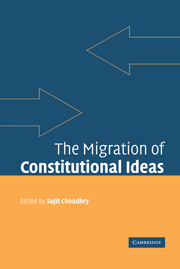Book contents
- Frontmatter
- Contents
- List of contributors
- Acknowledgements
- 1 Migration as a new metaphor in comparative constitutional law
- PART I The methodology of comparativism
- PART II Convergence toward a liberal democratic model?
- 5 Questioning the migration of constitutional ideas: rights, constitutionalism and the limits of convergence
- 6 Spreading liberal constitutionalism: an inquiry into the fate of free speech rights in new democracies
- 7 Underlying principles and the migration of reasoning templates: a trans-systemic reading of the Quebec Secession Reference
- 8 Migrating marriages and comparative constitutionalism
- PART III Comparative constitutional law, international law and transnational governance
- PART IV Comparative constitutional law in action – constitutionalism post 9/11
- Index
6 - Spreading liberal constitutionalism: an inquiry into the fate of free speech rights in new democracies
Published online by Cambridge University Press: 25 July 2009
- Frontmatter
- Contents
- List of contributors
- Acknowledgements
- 1 Migration as a new metaphor in comparative constitutional law
- PART I The methodology of comparativism
- PART II Convergence toward a liberal democratic model?
- 5 Questioning the migration of constitutional ideas: rights, constitutionalism and the limits of convergence
- 6 Spreading liberal constitutionalism: an inquiry into the fate of free speech rights in new democracies
- 7 Underlying principles and the migration of reasoning templates: a trans-systemic reading of the Quebec Secession Reference
- 8 Migrating marriages and comparative constitutionalism
- PART III Comparative constitutional law, international law and transnational governance
- PART IV Comparative constitutional law in action – constitutionalism post 9/11
- Index
Summary
Introduction
The second half of the twentieth century saw a proliferation of transitions from authoritarianism and colonial rule to constitutional democracy in virtually every corner of the world. This phenomenon started shortly before mid-century with Germany, Japan, India, Pakistan, and Israel, and continued several decades later with Greece, Portugal, and Spain. In the late 1980s and early 1990s, it spread through Central and Eastern Europe, followed by the repudiation of dictatorship in several Latin American countries. These various transitions were inspired by, and drew upon, various constitutional traditions, such as the US, British, French, and later, the German. Throughout this process, constitutional norms were ‘exported’ by established constitutional democracies and ‘imported’ into new democracies. Some norms were undoubtedly liberal, while others were not.
In this chapter, we assess the contribution of the transplantation of liberal constitutional norms to the spread and consolidation of liberal constitutionalism. Is the mere importation of such norms sufficient to pave the way for liberal constitutionalism? Or must certain preconditions prevail, or develop subsequently, for transplantation to succeed? Can importation of liberal constitutional norms have a significant impact notwithstanding the concurrent importation of non-liberal constitutional norms, such as those based on communitarian values, social-welfare objectives, or ethnocentric conceptions of citizenship?
A full assessment of the exportability of liberal constitutionalism is fraught with difficulties. A principal difficulty is that there is no agreement on the meaning of liberalism, much less on what rights or values are liberal or on what counts as a liberal interpretation or application of fundamental constitutional rights.
- Type
- Chapter
- Information
- The Migration of Constitutional Ideas , pp. 142 - 177Publisher: Cambridge University PressPrint publication year: 2007
- 3
- Cited by



